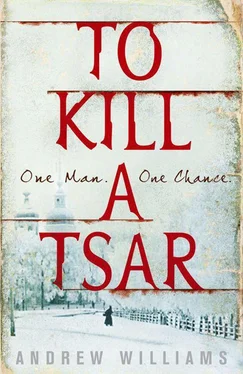He let Kletochnikov help him to his feet. His knees were shaking. The gendarmes had crowded into the room to gaze at the body of the student.
‘Go on, get out until I call you,’ he shouted. Surely they had seen a dead man before? ‘Not you, Kletochnikov. I want you to see if he’s got anything on him.’
The agent began pulling gingerly at the dead man’s jacket, while Barclay shuffled about the room in search of anything that might be a clue. The student must have been preparing to leave his flat that day, his personal belongings were packed into a small suitcase he had left at the door. In spite of the earliness of the hour, Popov was dressed and had eaten — the remains of a stale loaf and a glass of tea were on a table close to the window. The bed was stripped, the blankets neatly folded at the bottom of it. Barclay picked up the case — it was surprisingly heavy — and threw it on to the bed. Books. The usual texts; Marx, Chernyshevsky, Bakunin, a novel by Dickens and some threadbare and rather dirty clothes.
‘Anything?’ he asked, turning to Kletochnikov.
‘Only this ticket,’ he replied, rising stiffly to his feet. ‘Today’s train to Moscow, and another for Voronezh. Some money. A photograph.’
‘Let me see?’
It was of a woman in her late forties or early fifties, elegant, conservatively dressed, her figure a little matronly, perhaps Popov’s mother, but in any case not a terrorist. But then who could be sure these days?
‘Have you checked his boots and hat?’
Kletochnikov turned back to the body and began pulling clumsily at the dead man’s boots. The student’s navy blue cap had been thrown to the floor by the force of the bullet bursting from the side of his head and was sticky with blood and flecks of tissue. Barclay ripped at the cotton lining and it came away with ease. Nothing. No prisoner, no papers. It was a fiasco. For a few unpleasant seconds his thoughts turned to the interview with Dobrshinsky that would follow later in the day. Picking one of Popov’s shirts from the bed, he wiped the blood from his hands. Kletochnikov was still grunting over the student’s legs, making very heavy weather of a simple task.
In his effort to prise boot from foot, the agent had dragged the body from the window, leaving a crimson trail across the boards. Barclay’s eyes were drawn to a slash of sunlight flickering across the floor close to the student’s shattered head. The wood was scorched black.
‘Leave it, will you.’
There was a brutal thump as Kletochnikov dropped a booted foot.
‘Help me roll him over.’
Beneath the student’s body was a crushed heap of damp ashes and fragments of charred paper. Crouching beside it, Barclay took a pencil from his coat and stirred the pile for something worth salvaging. Popov had done a good job. There were only five pieces with anything he could decipher. Handwritten on the largest strip were a number of dates and the names of cities in the south — Kiev, Kharkov, Voronezh. The student was about to set out on his travels. There were two small fragments from an internal passport, almost certainly Popov’s own. A wanted man, he would have travelled on forged documents, although Kletochnikov had found none on his body. But it was the last two fragments that proved the most intriguing. They were from the same distinctive light blue letter paper and written, Barclay noted, in a cultured hand. Mikhailov’s? He would be able to establish that beyond doubt because a handwriting specimen collected from the revolutionary’s family was sitting in the top drawer of his desk at Fontanka 16.
Kovalenko will meet you at the station at precisely… The time was lost… money and instructions for you. Destroy all your papers then leave at once, and under no circumstances return to your apartment. It is being watched. We will deal with…
‘…with the informer,’ Barclay muttered.
‘Your Honour?’
‘Find the dvornik and ask him when Popov last received a letter. Take a description of whoever delivered it.’
So the student knew he was under surveillance. Mikhailov had warned him. How on earth did he find out? And Kovalenko — that was one of the six names on Bronstein’s list. Who was he? And the names of cities — contacts or meetings? Questions. Questions Barclay would have put to the fool at his feet if he had not blown the little brain he was blessed with about his shabby room.
‘All right,’ he shouted irritably to the gendarmes. ‘You can come in now.’
He would have them take the place apart, but he was quite certain they would find nothing more. At least the student had spared the empire the expense and trouble of a trial for murder. Sadly, the collegiate councillor was unlikely to take quite such a generous view of the morning’s events.
Hadfield remembered why the address was familiar over a breakfast of coffee and warm rolls. Fontanka 16. Foolish to forget. The Third Section of the tsar’s private chancellery. Goldenberg was watching a secret policeman or officer of the Gendarme Corps. Who? He worried at it like a dog with a bone. The answer came to him as he was brushing his jacket. Someone had attempted to take the life of the head of the Third Section. Hadfield had heard mention of it at the opera a few weeks before. A revolutionary fired two shots through the window of General Drenteln’s carriage and narrowly missed with both. Goldenberg was watching the general, no doubt with a view to making a better fist of it next time. But if that was the case, what on earth should he do about it? He was pondering this question before his dressing mirror when there was a sharp knock at the door of the apartment. Sergei, the dvornik, was on the step with an armful of birch logs for the fire, at his back three serving women in peasant smocks with stiff brushes attached to the soles of their boots.
‘The floor, Your Honour,’ he said, reaching awkwardly for his cap. ‘You said it would be convenient?’
Hadfield let them pass, then retreated to his bedroom to finish ministering to collar and tie. Gruff instructions and the squeak of furniture on the move reached him through the door and when, a moment later, he stepped back into the drawing room, it was to find the women gliding across his parquet like patineurs in an ice waltz. By the time he returned from the hospital the floor in every room would be polished to glassy perfection.
A little after eight o’clock the cab rattled to a halt before the main entrance to the Nikolaevsky. Hadfield was so caught up in his thoughts that the driver was obliged to jump from his seat and stand at the front wheel with his dirty palm open for the fare. What was there to decide? Hadfield asked himself as he counted out the kopeks. That he should go to the police was quite unthinkable. A few careless words and he would condemn not only Goldenberg to years in a Siberian camp but Anna and Evgenia too.
‘Very generous, Your Honour.’
The broad smile on the cabby’s face suggested Hadfield should have concentrated harder on the fare. He knew it would be wiser to have nothing to do with the clinic in Peski. Inevitably, he would be drawn into further contact with Goldenberg or men very like him. Resolve to have no more dealings with her while it is in your power to do so, he thought. Resolve now, here in this hospital on this bright morning.
‘Good morning, Your Honour.’ It was the old porter who kept order at the main door, cap in hand like a peasant on rent day. The long benches in the entrance hall were already crowded with soldiers and their families waiting to see a doctor. Nurses in stiff white pinafores and scarves bustled about them taking names and regiments and the symptoms of their complaints. The Nikolaevsky had opened as a military hospital in the reign of the tsar’s father and grown steadily ever since, its imposing yellow and white frontage creeping year by year down Slonovaya Street. In the few months Hadfield had spent there he had formed the impression that it was well run, clean and surprisingly progressive. Most of his patients were on the general wards, but his departmental superior was familiar with a paper he had written on public health and the pathology of diseases, and he had been asked to carry out a discreet review of general practices in parts of the hospital. It was his duty that day to visit the department for the treatment of mental diseases for the first time. The Nikolaevsky was an unforgiving place and although he asked for directions more than once he was still wandering its maze of broad white corridors half an hour later. Finally losing patience, he pressganged a porter into service as a guide. From the main buildings, he was led along a path through a rough garden to the hospital’s boiler house. Two low workmen’s huts had been built against its high wall, their roofs of rusty iron, their rough timber walls weathered and bare but for a few sloughs of green paint, their windows partly boarded.
Читать дальше












